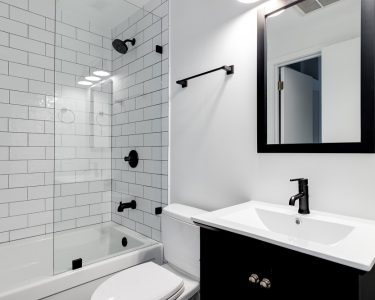Basements are always either dark and dingy, or beautiful finished additions with no in between. That difference can be the deciding factor between expanding the home’s usable space and market value. But with all the planning, cost, and construction involved, many homeowners ask the same thing: is it really worth it?
Let’s break down the benefits, costs, potential return on investment (ROI), and common uses for renovated basements. If you’re exploring basement renovation services, you’ll be able to make better decisions based on your home’s condition, your goals, and your budget.
Key Takeaways
- Basement renovations typically yield 50-75% ROI depending on location and quality
- Average cost ranges from $20,000 to $75,000 for complete renovations
- Adds valuable living space without extending your home’s footprint
- Solves common issues like poor insulation and moisture problems
- Versatile usage options including rental income potential
Benefits of Basement Renovation
Basement renovations add usable living space, increase property value, and are incredibly versatile. You can make your basement into a fully furnished living space, man cave, gym or more. They also resolve moisture issues and improve insulation.
One of the primary benefits of a basement renovation is adding function to a space you’re not using. Whether you want a game room, an office, or an in-law suite, your basement is a blank slate.
Renovations also address existing issues like poor insulation, outdated wiring, or moisture intrusion. When you make these upgrades, you improve your home’s energy efficiency and comfort.
A finished, functional basement is a huge selling point when listing your home for sale. Buyers love the flexibility of an already-finished lower level. If it includes living areas or more bathrooms, even better.
Determining If Your Basement Is Suitable for Renovation
Look for a dry, stable structure with high enough ceilings (usually 7 feet or more), accessible utilities, and minimal code violations. An inspection by a contractor helps assess viability.
Not every basement is ready to renovate as-is. The first step is to check its condition. If you see water stains, cracked walls, or uneven floors, they need to be fixed before construction begins.
Also, many municipalities need at least seven feet of ceiling clearance for habitable rooms. Low ceilings can limit how you use the space or increase costs if you need to dig down or raise the floor joists.
A licensed home inspector or contractor can examine structural soundness, assess existing utilities, and guide you on feasibility. If your basement already has proper insulation, ductwork, or a separate entrance, you’re usually good to go.
How To Budget Your Basement Renovation
Basement renovation costs vary depending on size, condition, and design choices. Basic remodels may cost a few thousand dollars. Full renovations with bathrooms or kitchens can exceed six figures.
Cost is the biggest consideration when determining whether basement renovation services are worth it. A basic renovation that adds drywall, flooring, and lighting might be affordable. Adding in plumbing, egress windows, or HVAC upgrades drives up the cost significantly.
Here are the most common cost factors to keep in mind:
- Size of the basement – Larger spaces need more materials and labor.
- Condition – Mold remediation, foundation repairs, or waterproofing adds cost.
- Purpose – A finished storage area is less expensive than a livable apartment.
- Permits and inspections – Required by most municipalities and come with fees.
- Finishes and design – High-end flooring, built-ins, and fixtures raise the budget.
While prices vary, understanding what you want from the renovation can help you plan a realistic budget and focus on which upgrades matter most.
Return on Investment for Basement Renovations
Basement renovations typically yield an ROI between 50% and 75%, depending on the home’s location, renovation quality, and how the space is used. Finished rooms, bathrooms, or apartments tend to produce better returns.
Unlike aesthetic updates, basement renovations contribute functional living space, which impacts your home’s valuation. Adding habitable square footage helps with appraisal values and listing appeal.
That said, ROI varies. If your basement becomes a legal bedroom or rental unit, the return may be higher due to its practicality. On the other hand, if it’s used for storage or hobby space, the financial return might be lower, but still valuable.
Often, homeowners don’t need to sell to see the benefit. Renting out a finished basement or using it to accommodate family brings financial and personal returns over time.
Versatile Uses for Your Renovated Basement
A finished basement can serve as a guest suite, home office, entertainment room, rental unit, gym, or storage space. The versatility makes it one of the most flexible areas in the home.
The biggest advantage of basement renovation services is the variety of ways you can use the sapce. Your renovation isn’t limited to a single function. It can change with your family’s needs.
Here are some of the most popular uses for a renovated basement:
- Home office – Especially valuable for remote workers or students.
- In-law suite or guest bedroom – Ideal for extended family or visitors.
- Home gym – A private workout space with custom flooring and ventilation.
- Entertainment zone – Movie rooms, bars, or game areas.
- Children’s playroom – A designated, safe area for toys and playtime.
- Rental unit – With a separate entrance, the space can generate monthly income.
Because basements are usually large and open, they allow for creative layouts or even many functions on one floor.
Pros and Cons of Basement Renovation
Pros
- Adds valuable living space without changing your home’s footprint
- Increases home value with potential ROI of 50-75%
- Solves existing problems like moisture and poor insulation
- Offers versatile usage options that can change over time
- Potential income source if finished as a rental unit
- Improves energy efficiency with proper insulation and sealing
- Creates separation for multi-generational living or work-from-home needs
Cons
- Significant upfront investment with costs ranging from $20,000-$75,000+
- Potential moisture issues if not waterproofed
- Limited natural light compared to above-ground spaces
- Lower ceiling height may restrict design options
- Requires permits and inspections which add time and cost
- May need egress windows for safety code compliance
- Utility systems may need upgrading (electrical, plumbing, HVAC)
Steps to Plan Your Basement Renovation
- Assess your basement’s condition – Check for water issues, measure ceiling height, and check the foundation
- Determine your renovation goals – Decide how you want to use the space and focus on features
- Set a realistic budget – Research costs for your specific project scope and location
- Consult professionals – Meet with contractors for assessments and quotes
- Check local regulations – Research permits, codes, and zoning requirements
- Develop a detailed plan – Create drawings and specifications for your project
- Address moisture issues first – Install proper waterproofing and drainage systems
- Upgrade utilities as needed – Update electrical, plumbing, and HVAC systems
- Frame and insulate walls – Install proper framing and insulation for comfort
- Complete finishing work – Add drywall, flooring, fixtures, and other finishes
- Final inspections – Ensure all work meets code requirements
- Furnish and enjoy – Add furniture and accessories that suit your new space
Ideal Timing for Your Basement Renovation
Spring and summer are the best times to renovate a basement. Humidity is lower and the exterior’s easier to access. Early planning helps with permits and contractor scheduling.
While basement renovations can be done year-round, some seasons offer better conditions. Spring and early summer are often ideal because drier weather helps with sealing, framing, and ventilation.
Contractor availability also peaks in spring, so schedule your project in advance. Winter can be a good time to plan and design so that construction can begin as soon as the weather permits.
If your project involves any excavation, like adding an egress window, you’ll want to avoid frozen or muddy ground.
Basement Renovation Services FAQs
Do I need a permit to renovate my basement?
Yes. Most jurisdictions need permits for electrical, plumbing, and structural renovations, even if you’re only finishing the walls and floors.
How long does a basement renovation take?
On average, it takes 4 to 12 weeks. Timelines vary based on size, complexity, and permit approvals.
Can a basement renovation increase home value?
Absolutely. Finished basements often boost resale value and marketability, especially when they include bedrooms or bathrooms.
Is it better to renovate all at once or in phases?
Renovating all at once is usually more efficient and cost-effective, but phasing is a good option if you’re managing a tight budget.
Is a Basement Renovation Worth It?
If you want to maximize your home’s square footage, enhance its functionality, and increase resale potential, basement renovation services are almost always worth it. The basement offers more than storage space. It offers opportunites to expand your lifestyle.
Before beginning, take time to check your space, set realistic goals, and work with professionals who understand the structural and regulatory requirements. A thoughtful renovation plan can turn an underused area into one of your home’s most valuable features.
Ready to see if your basement has potential? Reach out to a licensed contractor in your area to schedule a consultation and explore your options.




